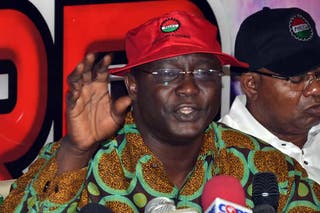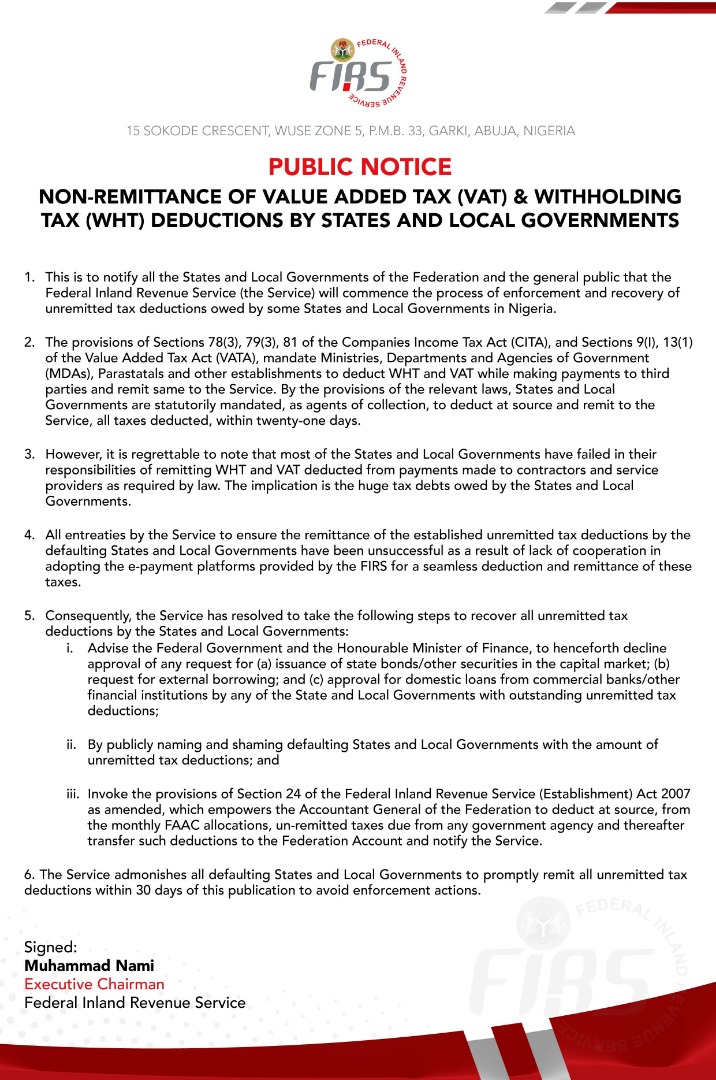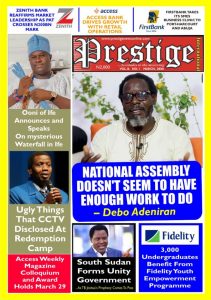-Courts to shut down as judiciary workers, others back strike
-Aviation unions to down tools, flights to be disrupted
-N1.3tn spent on electricity subsidy in two years –Osinbajo
Despite the two court orders restraining the Nigeria Labour Congress and the Trade Union Congress from embarking on their planned nationwide strike on Monday, the two labour unions have said they will go ahead with the industrial action.
They added that the mobilisation of workers for the strike and protest scheduled to commence on Monday had already commenced.
The NLC President, Ayuba Wabba and his TUC counterpart, Quadri Olaleye, told Saturday PUNCH in separate interviews on Friday that they had not been served the court processes and would therefore not suspend the proposed strike.
The NLC and TUC had jointly declared their readiness to embark on a nationwide strike to compel the Federal Government to reverse the recent hikes in electricity tariffs and petrol pump price. The hikes had generated nationwide criticism.
Justice Ibrahim Galadima of the National Industrial Court in Abuja on Friday issued a fresh restraining order against the unions, following an ex parte application by the Office of the Attorney-General of the Federation.
The fresh order came barely 24 hours after the same judge made a similar restraining ex parte order in favour of a group, Peace and Unity Ambassadors Association, on Thursday.
The judge, sitting as vacation judge, ordered that both the NLC and the TUC joined as the defendants in the suit should be served with the fresh court order within seven days from Friday.
The Federal Government of Nigeria and the AGF are the plaintiffs in the suit marked NICN/ABJ/257/2020. The ex parte application was signed by the AGF, Abubakar Malami (SAN).
The Acting Director of the Department of Civil Litigation, Federal Ministry of Justice, Mrs Maimuna Shiru, moved the ex parte application on behalf of the plaintiffs on Friday.
The judge ruled, “Upon careful evaluation and consideration of the motion ex parte filed by these claimants/applicants before me on this date, and after perusing the deposition contained in the affidavit in support as well as the affidavit of the urgency, I am convinced that the said application is meritorious and the same is granted as sought.
“Consequently, the order of interim injunction restraining the defendant is hereby granted as sought. The defendants/respondents shall be served within seven days from today (Friday) with the motion on notice as well as the other originating processes for the purpose of determining them by this court.”
The judge ordered that “the case file shall be remitted to the Honourable President of National Industrial Court of Nigeria for reassignment to the substantive judge.”
“Hearing date shall be issued and served on all parties accordingly,” he added.
In an affidavit filed in support of the application on Friday, the Federal Government stated that the labour unions’ planned industrial action “is premised on an ill-informed mindset that the claimants want to impose suffering on Nigerians due to the increase in electricity tariffs and deregulation of petroleum prices”.
But responding to Saturday PUNCH’s questions, Wabba in a series of text messages to one of our correspondents stated that the NLC union had not been served with both court orders.
He stated, “We have not been served with the order of any court. The right to assemble peacefully and protest is guaranteed by the Nigerian constitution. It’s a universal right; our political elite exercised this right without hindrance.
“It could be recalled that the dialogue between the Federal Government and organised labour ended after 9pm yesterday (Thursday) where the government team adjourned the meeting for consultation.”
Wabba said, “The social media reported a court order obtained by an NGO which we were not served. We are equally not served any court process by the government. I think it’s meant to divert attention from the issues at stake. We have not been put on notice or served any process.”
Similarly, when asked if the strike would proceed as planned if the dialogue between the unions and the Federal Government scheduled to continue on Monday failed to yield fruits, the TUC president said “yes”.
Following the hikes in electricity tariffs and fuel pump price, the Federal Government and the labour unions had met penultimate Tuesday but the dialogue ended in a deadlock on account of the failure of the government to reverse the price increase or offer palliatives to cushion the effects of the hikes on workers.
The NLC and TUC subsequently declared strike and protest as both unions said they would collaborate to execute the industrial action for maximum effect.
At the second meeting held at the Presidential Villa Banquet Hall on Thursday evening, the Federal Government team and the labour representatives also failed to reach a resolution prompting the adjournment of the dialogue to Monday.
To avert the strike, the government reportedly offered palliatives, including mass and affordable housing for workers and procurement of transport buses to help reduce the impact of the rise in fuel price.
The FG was also said to have proposed that the Central Bank and the Ministry of Agriculture would help farmers with loans, including N2.5bn as fresh palliatives to workers on levels one to four. They also agreed that the government would not tax the minimum wage.
However, there was no consensus as the labour unions were asked to consult with their organs on the government offers and revert on Monday when the next rounds of discussions would hold.
The NLC President had said the hikes, coupled with the increase of Value Added Tax to 7.5 per cent and numerous charges by commercial banks on depositors’ funds, all in the midst of the COVID-19 pandemic were not only ill-timed but also counterproductive. He said these would further impoverish Nigerian workers, citizens and their families.
Courts to shut down as judiciary workers, others back strike
Meanwhile, judiciary workers, under the aegis of Judicial Staff Union of Nigeria, have said they would shut down courts nationwide on Monday in compliance with NLC and TUC’s directive.
The President of JUSUN, Marwan Adamu, told one of our correspondents on Friday that as an affiliate of NLC, the union of judiciary workers was bound by the umbrella body’s directive.
“The strike is not JUSUN strike; it is NLC strike. As an affiliate of NLC, we are bound by the strike declaration, so we are joining the strike,” Adamu said.
Asked if the restraining order by the Industrial Court would not be complied with, Adamu said, “The order has not been served on us, so the strike will go on”.
Adamu confirmed that the notice for the strike had been circulated to various courts and judicial institutions across the country.
Aviation unions to down tools, flights to be disrupted
In a related development, four aviation unions have backed the strike action proposed by the Organised Labour.
The National Union of Air Transport Employees, National Association of Aircraft Pilots and Engineers, Air Transport Services Senior Staff Association of Nigeria, and the Association of Nigerian Aviation Professionals in a joint statement on Friday therefore directed all workers in the sector to withdraw their services nationwide, which might disrupt flights across the airports.
The statement titled, ‘Notice of nationwide strike action to all aviation workers’ and dated September 24, 2020, read, “Our unions as above named are all in support of the strike action. As such, all workers in the aviation sector are hereby directed to withdraw their services at all aerodromes nationwide from 00:00 of September 28, 2020 until otherwise communicated by the NLC/TUC or our unions. All workers shall comply.”
We’re ready for strike, protest – Academic technologists
Also, the National Association of Academic Technologists has endorsed the strike, saying its members across the country were ready to join forces with the organised labour.
NAAT’s National President, Ibeji Nwokoma, said the association resolved at its 43rd National Executive Council meeting held between September 21 and 25 that it would not hesitate to shut schools again if the government failed to address the non-payment of minimum wage arrears to all the tertiary institutions’ staff, including its members.
The communiqué read by Nwokoma after their meeting partly read, “There is the urgent need to resolve all the issues that might lead to total and indefinite strike action as directed by the NLC, of which NAAT is an affiliate. Government should address all the issues raised to avoid labour unions’ action which is dangerous for our economy.”
NUPENG, nurses, civil service union mobilise members for strike
The Nigeria Union of Petroleum and Natural Gas Workers also said it had mobilised oil workers across the country in line with NLC’s directive.
NUPENG in a letter dated September 24, signed by the General-Secretary, Afolabi Olawale, directed the chairmen/heads of administration, Port Harcourt, Lagos, Warri and Kaduna zonal councils to mobilise oil workers for the industrial action.
Similarly, the National Association of Nigerian Nurses and Midwives in a letter dated September 22, signed by Ikenna Eze, also directed the chairmen and secretaries of state chapters of NANNM to comply with the strike action announced by the NLC.
A letter by the General Secretary of the Nigeria Civil Service Union, Yahaya Ndako, dated September 24, also directed all the state and federal councils of the union to shut down the economy as directed by the congress on September 28.
It read, “Sequel to the NLC emergency National Executive Council meeting held on September 22, 2020, at Labour House, Abuja, it was resolved, amongst others, to shut down the economy of the country come September 28 due to the failure of the Federal Government to revert the hikes in pump price and electricity tariffs.”
Industrial action’ll worsen economy, govs warn NLC, TUC
Governors of the 36 states, under the aegis of the Nigeria Governors’ Forum, said they had resolved to “intercede with the labour unions, the Federal Government and other stakeholders and especially call labour to exercise caution in its plan to embark on an indefinite strike action,” noting that such action would worsen the already deteriorating economic situation of the workers brought about by the COVID-19 pandemic.
They also agreed to set up a committee made up of the Governors of Jigawa (Chairman), Nasarawa, Ogun, Kwara, Gombe, Abia and Bayelsa states to interface with the National Economic Council, labour unions and relevant stakeholders for the overall interest of the country.
“Governors insisted that subsidy in the petroleum sector, apart from promoting corruption in petroleum pricing and distribution, brings about loss of revenues to the three tiers of government and loss of jobs to the populace,” NGF’s statement added.
NLC, JAF, others begin mobilisation
Meanwhile, the NLC, the Joint Action Front, Trade Union Congress and other labour unions on Friday began mobilising Nigerians to join the total shutdown planned for Monday.
The unions, at a public symposium in Lagos in preparation for the strike action, said the Federal Government had failed to deliver on its campaign promises.
NLC Deputy President, Joe Ajaero, JAF’s Deputy Chairperson, Achike Chude, and the South-West Coordinator of the National Association of Nigerian Students, Kappo Samuel, were among the speakers at the symposium, themed, ‘Nationwide strike and mass actions commencing September 28: issues and way forward.’
Ajaero, represented by Mr Chris Onyeka, called on Nigerians to show solidarity and join the cause to free the country from a “repressive government.”
He said, “Nigerians are well familiar with the issues on the ground. The recent hikes in the prices of fuel and electricity at a time when other governments are lessening the socio-economic burdens on their citizens at this period of our exit from the COVID-19 pandemic are not acceptable. We condemn it and we are going to fight it. That is the duty we owe Nigerians and we call on everyone to join us.”
The South-West NANS coordinator, said, “There is no way we can be calling for the repair of refineries in 2020. The Federal Government needs to build at least five new refineries. Government should not be importing what we are able to produce. We are going to mobilise students to join the strike action.”
We spent N1.3tn on electricity subsidy in two years – Osinbajo
Meanwhile, the Vice-President, Prof Yemi Osinbajo, has said the Federal Government spent N1.3tn on electricity subsidy in the last two years.
He therefore explained that with the current economic situation and about 60 per cent drop in government’s revenue, it was no longer sustainable to continue subsidising them.
The Nigerian Electricity Regulatory Commission had recently announced the increase of electricity bill from N30.23 for one kilowatt unit of energy per hour to N62.33 per kWh, which is over 100 per cent. The NERC described the new charges as Service Reflective Tariff.
Speaking on Thursday at a webinar entitled, ‘Bouncing back: Nigeria’s post-pandemic recovery plan’, organised by The Africa Report and anchored by the Editor-in-Chief, Patrick Smith, the vice-president noted, “As we all know, the power sector is privatised except for transmission, but what we have seen is that the distribution companies are not able to meet their target or provide electricity on a stable basis.
“At this point, we have close to 11,000MW and installed capacity of close to 13,000MW but we are able to dispatch about 4,000MW while we have the capacity to do about 5,000MW. But even part of that is rejected because the DisCos would say they couldn’t sell, and in any case this is the fault of many of them because there is no metering.
“So, naturally, people resist the estimated billing and they have been hampering on a cost-reflective tariff all these years, so the government has been paying the subsidy. In the past two years, we have spent about N1.3tn on subsidies for electricity, but in the situation we are now, it’s completely unaffordable. There is no question at all that we are, in terms of our finances, going through possibly the most difficult period in our recent history.”
Anglican bishop berates FG over tariffs increase
The Bishop of the Akure Diocese of the Church of Nigeria, Anglican Communion, Simeon Borokini, has said the government is not sensitive to the plight of the citizens with the tariff increase, considering the impact of the COVID-19 pandemic on them.
Speaking on Friday at the diocese’s synod, themed ‘Desiring the word of God’, held at St Stephen’s Anglican Church, Akure, Borokini, stated, “Many advanced countries are making life easier for their citizens through tax cuts and palliatives, the Nigerian government is doing the exact opposite. There is an increase in the prices of electricity and fuel which are uncalled for at this time.”
– Saturday PUNCH





























